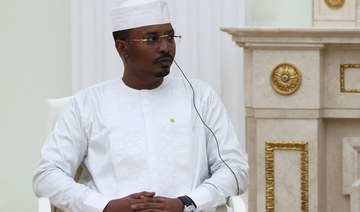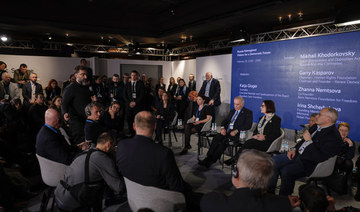BUFFALO, N.Y.: A white supremacist who killed 10 Black people at a Buffalo supermarket was sentenced to life in prison without parole Wednesday after relatives of his victims confronted him with pain and rage caused by his racist attack.
Anger briefly turned physical at Payton Gendron’s sentencing when a victim’s family member rushed at him from the audience. The man was quickly restrained; prosecutors later said he wouldn’t be charged. The proceeding then resumed with an emotional outpouring from people who lost loved ones or were themselves wounded in the attack.
Gendron, whose hatred was fueled by racist conspiracy theories he encountered online, cried during some of the testimony and apologized to victims and their families in a brief statement.
Their remarks ranged from sorrow to outrage, shouts to tears. Some vehemently condemned him; others quoted from the Bible or said they were praying for him. Several pointed out that he deliberately attacked a Black community a three-hour drive from his home in overwhelmingly white Conklin, New York.
“You’ve been brainwashed,” Wayne Jones Sr., the only child of victim Celestine Chaney, said as sobs rose from the audience. “You don’t even know Black people that much to hate them. You learned this on the Internet.”
“I hope you find it in your heart to apologize to these people, man. You did wrong for no reason,” Jones said.
Gendron’s victims at the Tops Friendly Market — the only supermarket and a neighborhood hub on Buffalo’s largely Black East Side — included a church deacon, the grocery store’s guard, a man shopping for a birthday cake, a grandmother of nine and the mother of a former Buffalo fire commissioner. The victims ranged in age from 32 to 86.
Gendron pleaded guilty in November to crimes including murder and domestic terrorism motivated by hate, a charge that carried an automatic life sentence.
“There can be no mercy for you, no understanding, no second chances,” Judge Susan Eagan said as she sentenced him. She called his rampage “a reckoning” for a nation “founded and built, in part, on white supremacy.”
Gendron, 19, is due in a federal court Thursday for a status update in a separate case that could carry a death sentence if prosecutors seek it. His attorney said in December that Gendron is prepared to plead guilty in federal court to avoid execution. New York state does not have the death penalty.
The gunman wore bullet-resistant armor and a helmet equipped with a livestreaming camera as he carried out the May 14 attack with a semiautomatic rifle he purchased legally but then modified so he could load it with illegal high-capacity ammunition magazines.
“Do I hate you? No. Do I want you to die? No. I want you to stay alive. I want you to think about this every day of your life,” Tamika Harper, a niece of victim Geraldine Talley, told Gendron. “Think about my family and the other nine families that you’ve destroyed forever.”
Gendron locked eyes with Harper as she gently spoke. Then he lowered his head and wept.
Minutes later, Barbara Massey Mapps excoriated him for killing her 72-year-old sister, Katherine Massey, a neighborhood activist. As Mapps shouted and pointed at Gendron, a person in the audience took a few steps toward him before getting held back.
“You don’t know what we’re going through,” a man shouted as he was led away by court officers. For several minutes thereafter, family members hugged and calmed each other.
Eagan then ordered Gendron back in after admonishing everyone to behave appropriately.
In his short statement, Gendron acknowledged he “shot and killed people because they were Black.”
“I believed what I read online and acted out of hate, and now I can’t take it back, but I wish I could, and I don’t want anyone to be inspired by me,” he told the victims and their relatives. His own parents didn’t attend.
One woman in the audience stood up, screamed “we don’t need” his remarks and stormed out of the courtroom.
There were only three survivors among the 13 people he shot while specifically seeking out Black shoppers and workers.
Deja Brown said her father, Andre Mackniel, was blindsided “at the hands of a selfish boy who’s obviously not educated on the history of African Americans.”
Mackniel’s young son still calls for a father who was gunned down while shopping for a birthday cake for him, said his brother, Vyonne Elliott.
Christopher Braden, a Tops employee who was shot in the leg, said he was haunted by seeing the victims where they lay as he was carried out of the store.
“The visions haunt me in my sleep and every day,” he said.
In documents posted online, Gendron said he hoped the attack would help preserve white power in the US He wrote that he picked the Tops grocery store because it is in a predominantly Black neighborhood. Prosecutor Justin Caldwell said Gendron hoped to start a race war, but instead the community came together.
Reacting from Washington, NAACP President Derrick Johnson called on federal leaders to acknowledge “the constant threat of violence” to Black communities and urged the media to stop spreading misinformation that feeds racist conspiracy theories.
The mass shooting in Buffalo, soon followed by another that killed 19 students and two teachers at a Texas elementary school, amplified calls for stronger gun controls.
New York legislators quickly passed a law banning semiautomatic rifle sales to most people under age 21. The state also banned sales of some types of body armor.
In June, President Joe Biden, a Democrat, signed a compromise gun violence bill intended to toughen background checks, keep firearms from more domestic violence offenders and help states make it easier for authorities to take weapons from people adjudged to be dangerous.
White supremacist gets life in prison for Buffalo massacre
https://arab.news/v7edv
White supremacist gets life in prison for Buffalo massacre

Philippines, US fire at ‘invasion’ force in South China Sea war games
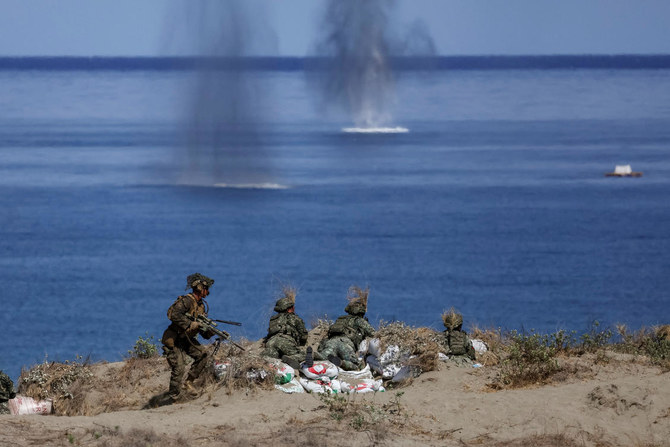
- Thousands of troops are conducting maneuvers against a backdrop of increased confrontations between Chinese and Filipino vessels around shoals in the South China Sea
Thousands of troops are conducting land, sea and air maneuvers against a backdrop of increased confrontations between Chinese and Filipino vessels around shoals in the South China Sea claimed by Manila, as well as stepped-up Chinese air and naval activity around nearby self-ruled Taiwan.
US troops massed at a strip of sand dunes on Luzon island’s northwest coast — around 400 kilometers south of Taiwan — let loose more than 50 live 155mm howitzer rounds at floating targets about five kilometers off the coast, AFP journalists saw.
Filipino troops followed up by firing rockets aimed at wearing down the attackers, before the two forces finished the job with machine guns, Javelin missiles and more artillery rounds.
Lt. Gen. Michael Cederholm, commander of the US First Marine Expeditionary Force, said the exercise was “to prepare for the worst” by “securing key maritime terrain.”
“It’s designed to repel an invasion,” Cederholm told reporters at the exercise site.
“Our northwestern side is more exposed,” Major General Marvin Licudine, exercise director for the Filipinos, said ahead of the live firing at the La Paz sand dunes near Laoag city.
“Because of the regional problems that we have... we have to already practice and orient ourselves in our own land in these parts,” he added.
Beijing claims almost the entire South China Sea despite an international ruling that its assertion has no legal basis.
It deploys hundreds of coast guard, navy and other vessels to patrol and militarise the waters.
Just last week, Manila said the China Coast Guard damaged a Philippine Coast Guard ship and another government vessel in water cannon attacks around the disputed China-controlled Scarborough Shoal in the South China Sea on April 30.
More than 16,700 Filipino and American troops are taking part in the annual military drills — dubbed Balikatan, or “shoulder to shoulder” in Tagalog — in multiple locations across the Asian archipelago.
Maritime confrontations between China and the Philippines have raised fears of a wider conflict that could involve the United States and other allies.
Monday’s exercise came days after the defense ministers of the Philippines, the United States, Japan and Australia met in Hawaii and issued a joint statement on their strong objections to the “dangerous and destabilising conduct” of China in the South China Sea.
The ministers “discussed opportunities to further advance defense cooperation” and to “work together to support states exercising their rights and freedoms in the South China Sea.”
Last week, US forces taking part in the Balikatan exercises fired HIMARS precision rockets into the South China Sea from the western island of Palawan, the nearest major Philippine landmass to the hotly disputed Spratly Islands.
The US Marine Corps said the maneuver was a rehearsal for the rapid deployment of the missile system across the Philippines’ South China Sea coast to “secure and protect Philippines’ maritime terrain, territorial waters and exclusive economic zone interests.”
The confrontations between the Philippines and China comes as tensions have ratcheted up between Beijing and Taipei, which is about to inaugurate a new president regarded by China as a dangerous separatist.
Taiwan’s defense ministry said Friday it had detected 26 Chinese aircraft and five naval vessels around the self-ruled island in the previous 24 hours.
“To a degree, military exercises are a form of deterrence,” Philippine Foreign Secretary Enrique Manalo was quoted as saying in remarks delivered on his behalf by an aide at a public workshop on Friday.
“The more we simulate, the less we actuate,” he added.
Italy’s pragmatic prime minister leads charge for EU far right
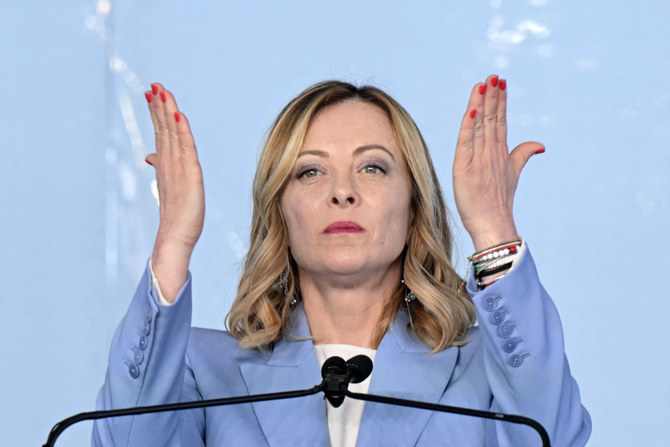
- Her strong support for Ukraine has won her friends in Washington and Brussels, particularly after she helped persuade Hungary’s Viktor Orban to drop his veto of EU aid to Kyiv
- Meloni has also worked closely with European Commission President Ursula von der Leyen, particularly on migration, a priority for the far-right premier
ROME: Having fostered pragmatic relations with Brussels, Italy’s Giorgia Meloni is for many the “moderate” face of Europe’s radical right — and is leading the charge for June elections.
The ascent to power of Meloni’s post-fascist, euroskeptic Brothers of Italy in 2022 sent shockwaves through the European Union, sparking fears of a lurch to the right within a founding member of both the bloc and NATO.
But her strong support for Ukraine has won Meloni friends in Washington and Brussels, particularly after she helped persuade Hungary’s Viktor Orban — a long-time ally sympathetic to Moscow — to drop his veto of EU aid to Kyiv.
Meloni has also worked closely with European Commission President Ursula von der Leyen, particularly on migration, a priority for the far-right premier.
“At a European level, she’s trying to present herself as a sort of moderate conservative and mediator” with the rest of the radical right, noted Lorenzo Castellani, a political analyst at Rome’s LUISS University.
At home, Meloni has pursued a nationalist populist agenda focused on traditional family values, law and order, and migration, including a clampdown on rescue ships operating in the central Mediterranean.
It has raised hackles among the Italian left — particularly moves to exert influence over the RAI public state broadcaster — but nothing yet to spark alarm in Brussels, as with judicial reforms in Hungary and Poland.
Fiscal policy meanwhile has been relatively prudent, reflecting the constraints of being part of the EU’s single currency.
“She wants to be in many aspects the acceptable extreme for the rest of the European political establishment,” Castellani told AFP.
“She’s like the last island before the border.”

“More credible”
Meloni heads the European Conservatives and Reformists (ECR) group in the European Parliament, which includes Spain’s Vox, Poland’s populist Law and Justice (PiS), and France’s Reconquete!.
Marked by a pro-Ukraine, pro-NATO stance, it is viewed as more credible by the Brussels establishment than the other far-right grouping, the euroskeptic Identity and Democracy group (ID).
ID includes Marine Le Pen’s National Rally (RN) in France, Germany’s anti-immigrant AfD and Meloni’s own coalition ally, Matteo Salvini’s far-right League.
Rosa Balfour, director of the Carnegie Europe think tank, says both Rome and Brussels have benefited from a pragmatic working relationship.
“What the Commission has been doing is embrace Meloni and isolate Orban,” who is not part of either grouping, she told AFP.
“And that’s worked very well for Italy because Meloni has managed to extract concessions.”
This has mainly entailed EU support for the premier’s efforts to stop the tens of thousands of migrants who land on Italy’s shores each year on boats from North Africa.
Von der Leyen joined Meloni on the island of Lampedusa last year after a surge in arrivals, and the two women joined EU delegations to Egypt and Tunisia in recent months to agree new deals on energy and migration.
Building bridges
Analysts say the shift to a tougher EU approach on migration was well underway before Meloni arrived — but that has not stopped her claiming credit.
“We want Italy to be central to changing what doesn’t work in Europe,” she said during her election campaign launch last month.
She is standing in the vote — despite an EU rule barring government ministers from taking up their seats — and urged the European right to follow her example.
“We want to do in Europe exactly what we did in Italy on September 25, 2022,” she said.
But Castellani calls this a “bluff.”

“The real game she’s playing is trying to enter within the European game of alliances,” he said, notably building bridges between the ECR and Von der Leyen’s conservative European People’s Party (EPP).
The divisions in the European right are echoed within Meloni’s coalition, notably between her and Salvini — they share similar domestic priorities but differ on foreign affairs.
Salvini’s League has a history of warm ties with Moscow, while he never misses an opportunity to criticize Brussels.
But he has been eclipsed. The League came top in 2019 European elections in Italy with 34 percent, but is now polling closer to eight percent, compared to more than 27 percent for Meloni’s Brothers of Italy.
Fresh face, skilled communicator
Surveys show voters are supportive of Meloni’s foreign policy — and less so of her migration efforts — but Lorenzo Pregliasco, founder of polling company YouTrend, says personality plays a big role.
Meloni is also seen as “more credible” than other Italian leaders, a skilled communicator and a “genuine figure, someone who says what she thinks,” he told AFP.
He notes her 2022 victory was driven by her image as a fresh face, the only party leader who did not join Mario Draghi’s technocratic government.
With the opposition still divided, as they were back then, he predicts she could stay in power for the full five-year term.
But by then the political landscape may be very different, not least if Donald Trump wins the November US presidential election.
Balfour suggests Meloni may have to reposition herself.
If Trump wins, “then you’ve got all the political leaders elbowing each other to lead the right. And Orban has already positioned himself there.”
Chad votes in first Sahel presidential poll since wave of coups
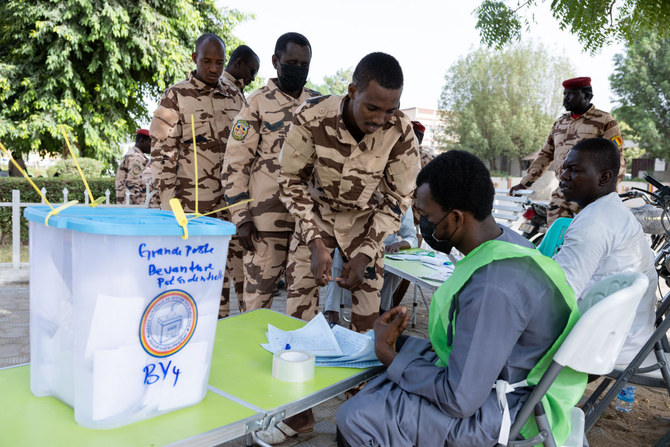
- Monday's vote pits military ruler Mahamat Idriss against his prime minister Succes Masra, previously a political opponent who fled into exile in 2022 but was allowed back a year later
N’DJAMENA: Chadians go to the polls on Monday three years after their military leader seized power, in the first presidential election in Africa’s Sahel region since a wave of coups.
Analysts say Mahamat Idriss Deby, who seized power the day rebels killed his long-ruling father Idriss Deby in April 2021, is most likely to win, although his chief opponent has been drawing larger-than-expected crowds on the campaign trail.
Deby has promised to bolster security, strengthen the rule of law and increase electricity production.
The vote coincides with a temporary withdrawal of US troops from Chad, an important Western ally in a region of West and Central Africa courted by Russia and wracked by jihadism.
Polls open at 7 a.m. and close at 5 p.m., with some 8.5 million people registered to vote.
Soldiers began early voting on Sunday.
Provisional results are expected by May 21 and final results by June 5. If no candidate wins more than 50 percent of the votes, a run-off will be held on June 22.
Since replacing his father at the helm of the oil-producing Central African country, Deby has remained close with former colonial power and longtime ally France.
While other junta-ruled Sahel countries including Mali, Burkina Faso and Niger have told Paris and other Western powers to withdraw and turned to Moscow for support, Chad remains the last Sahel state with a substantial French military presence.
The US, however, announced a temporary withdrawal of at least some troops last month, saying it would continue with a review of security operations after the election.
Opposition concerns
Monday’s vote pits Deby against his prime minister Succes Masra, previously a political opponent who fled into exile in 2022 but was allowed back a year later. Also running are former prime minister Albert Pahimi Padacke and seven other candidates.
Yaya Dillo, an opposition politician who had been expected to run against Deby despite coming from the same clan, was shot and killed in the capital N’Djamena on Feb. 28, the day the election date was announced.
Padacke has accused Masra of collaborating with Deby. But Masra has attracted large crowds to his own rallies.
Some opposition members and civil society groups have called for a boycott, citing concerns about possible vote-rigging.
That has raised fears of potential violence.
“This presidential election is of capital importance for the country because an entire people aspires for change,” said Baniara Yoyana, a former minister and magistrate.
“The process must be conducted with transparency to avoid any risk of confrontation.”
One Deby supporter, however, said he expected no problems.
“We want the election to go well and peacefully,” said Abdelkhader Sougui, a 28-year-old student.
“My wish is to go out and vote the morning of May 6 to confirm our victory... in the first round.”
Exiled Russian historian rallies fellow emigrants in dark times

- Tamara Eidelman is part of a group of exiled anti-war Russian public intellectuals and cultural figures who are rebuilding their careers abroad
- More than 800,000 Russians are estimated to have left the country in just the past two years after Russia invaded Ukraine
WASHINGTON: Russian dissident historian Tamara Eidelman was on vacation in Greece when Moscow’s tanks rolled into Ukraine in February 2022 and she realized that she would not be going back to her home country.
With her single suitcase, Eidelman, 65, flew to Portugal, where her daughter had been living, and began a new life in exile.
“I am operating under the assumption that I will not return. I am building my life in Portugal,” Eidelman, who has over 1.6 million followers on her history channel on YouTube, told AFP. “I want to come back... but if I sit every day thinking ‘When will it finally happen?’ I will go mad.”
Eidelman, who was declared a “foreign agent” by the government in Moscow, is part of a group of exiled anti-war Russian public intellectuals and cultural figures who are rebuilding their careers abroad.
While they cater to a large diaspora — more than 800,000 Russians are estimated to have left the country in just the past two years — unlike the previous waves of emigration from Russia’s calamities, they are able to continue speaking to those who stayed via social media, despite growing government restrictions.
“I think it’s one of the advantages of today’s emigration, if there can be any advantages, that our ties with our homeland have not been ruptured so drastically,” Eidelman, who wore a pin in the colors of the Ukrainian flag on her black blouse, said before a lecture in a community center outside Washington.
“Today there is an opportunity to exchange ideas. And, despite all the bans, inside Russia you can still access what is being done by those who emigrated. It is extremely valuable, it must be used and cherished.”

While exiles are unlikely to have a significant impact on political life inside Russia, “they can be the keepers of ideas, the centers of expertise and civic education,” according to Alexander Morozov, a political analyst and lecturer at Charles University in Prague.
When political change occurs, “Those who have retained trust and their symbolic capital can play a role in Russia’s renewal,” he wrote in a recent paper.
During her first few months in Portugal, Eidelman, who worked as a history teacher at a prestigious Moscow school for more than 30 years before becoming an editor, blogger and public speaker, kept herself busy looking for a place to live, reassembling her YouTube team and signing up for Portuguese lessons.
But she would catch herself thinking she was there on a brief visit and that she needed to buy a bottle of Port wine to bring back to Moscow to her mother and friends. Then it hit her.
“I felt a tremendous weight pressing on me when things had settled down a little and I realized that I am going to be in this wonderful, beautiful country for a long time,” she said. “Of course, (President Vladimir Putin’s) regime will collapse, but I don’t know if I will be around to see it.”
Since the start of Russia’s full-scale invasion, Eidelman’s YouTube channel has ballooned from some 500,000 followers to 1.63 million and a team of 30 people, with lectures on Russian, Ukrainian and world history — as well as a special presentation on Putin’s assault on democracy, which she delivered in a T-shirt that read “No Putin No War.”
“I want to express my unconditional support for Ukraine in this war and I believe that all its territories, including Crimea, must be returned to it,” Eidelman told AFP, referring to the Black Sea peninsula that Russia annexed in 2014.
During her lecture in an auditorium of several hundred Russian speakers titled “The Judgment of History,” Eidelman examined the painful questions of countries’ and societies’ culpability and responsibility for crimes from ancient Greece to Nazi Germany — with the clear undertone of Russia’s war in Ukraine.
Prosecuting those who committed direct crimes against Ukraine will not be enough, Eidelman suggested in her interview with AFP.
“I believe that there cannot be collective responsibility, that a whole people cannot be guilty,” she told AFP. “But at the same time, there must be... moral responsibility, responsibility before one’s conscience.”
Alina, a 39-year-old Russia-born quality control manager drove more than eight hours to Washington from the southern US state of Tennessee with her husband and two children to hear Eidelman speak.
To Alina, Russia’s invasion of Ukraine is “a crime against a neighboring country, but it’s also a crime against my own country because crimes are being committed in the name of people like me, who don’t agree with it.”
In these tragic times, Eidelman’s talk was a breath of fresh air, Alina said.
“When I listen to her lectures, I believe that there is — if not hope, then at least some light ahead for you to follow,” she said. “You get the feeling that you are not alone in all of this, even though physically you live apart from everyone.”
md/bgs/caw
Trump says Biden administration uses ‘Gestapo’ tactics: US media
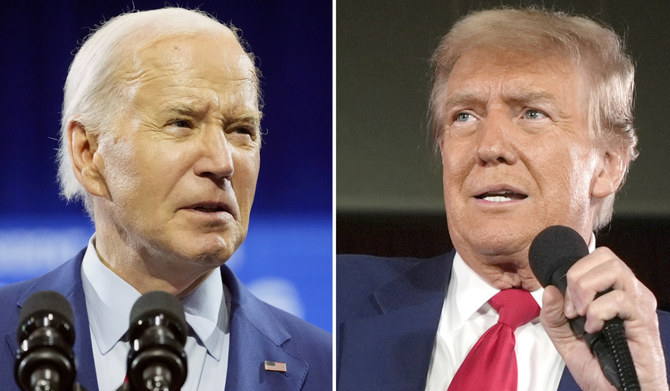
- The “Gestapo” comment came as the campaign has begun heating up, and it follows several other Trump remarks that critics have said are dangerously inflammatory, including calling political rivals “vermin” and comparing immigrants to “animals”
WASHINGTON: Former president Donald Trump has sharpened his allegation that his Democratic successor has weaponized the US justice system against him, comparing Joe Biden’s tactics to those of Hitler’s Gestapo, American media reported Sunday.
The Republican 2024 presidential candidate made the remark during a private meeting Saturday with top party leaders and wealthy donors at his Mar-a-Lago resort in Florida, according to a recording provided to US media by one donor.
In a 90-minute speech, Trump accused the Democrats of “running a Gestapo administration,” referring to the secret police force in Nazi Germany. “It’s the only way they’re going to win,” he said.
The “Gestapo” comment came as the campaign has begun heating up, and it follows several other Trump remarks that critics have said are dangerously inflammatory, including calling political rivals “vermin” and comparing immigrants to “animals.”
His comments in Mar-a-Lago brought loud applause from the audience, which included a number of potential vice presidential picks, according to Politico.
He again lashed out at the prosecutors who have brought four separate court cases against him, including the hush-money trial now taking place in New York.
Trump denounced what he claimed was a “witch hunt” hatched by the Democratic administration to eliminate his key presidential rival.
The White House, which has denied any involvement in the legal cases, denounced Trump’s comments on Sunday.
“Instead of echoing the appalling rhetoric of fascists, lunching with Neo Nazis, and fanning debunked conspiracy theories that have cost brave police officers their lives, President Biden is bringing the American people together around our shared democratic values and the rule of law,” spokesman Andrew Bates said.
Biden’s campaign also responded, saying the Republican’s angry remarks confirmed “what we already knew: Trump’s campaign is about him. His fury, his revenge, his lies, and his retribution.”




